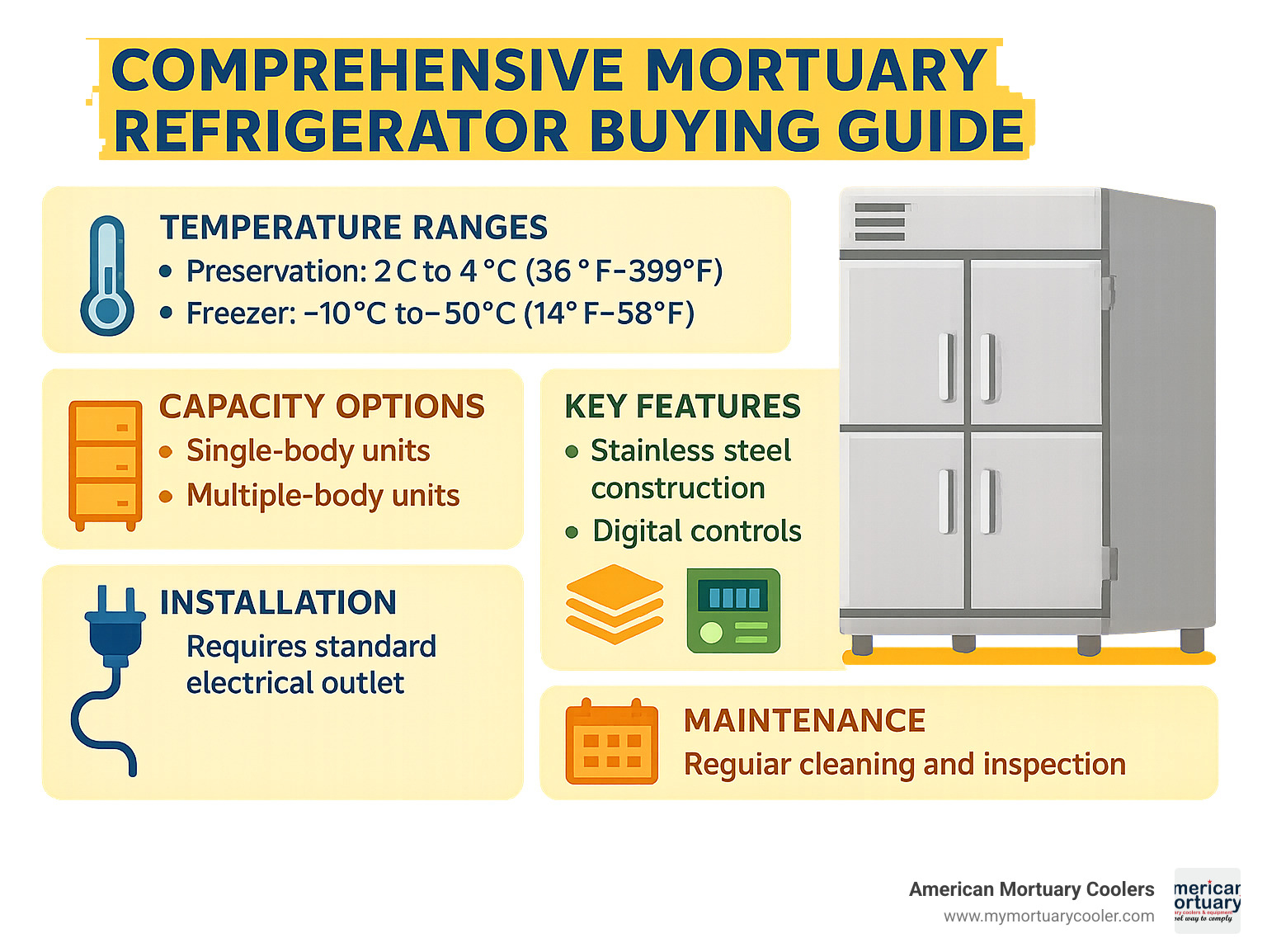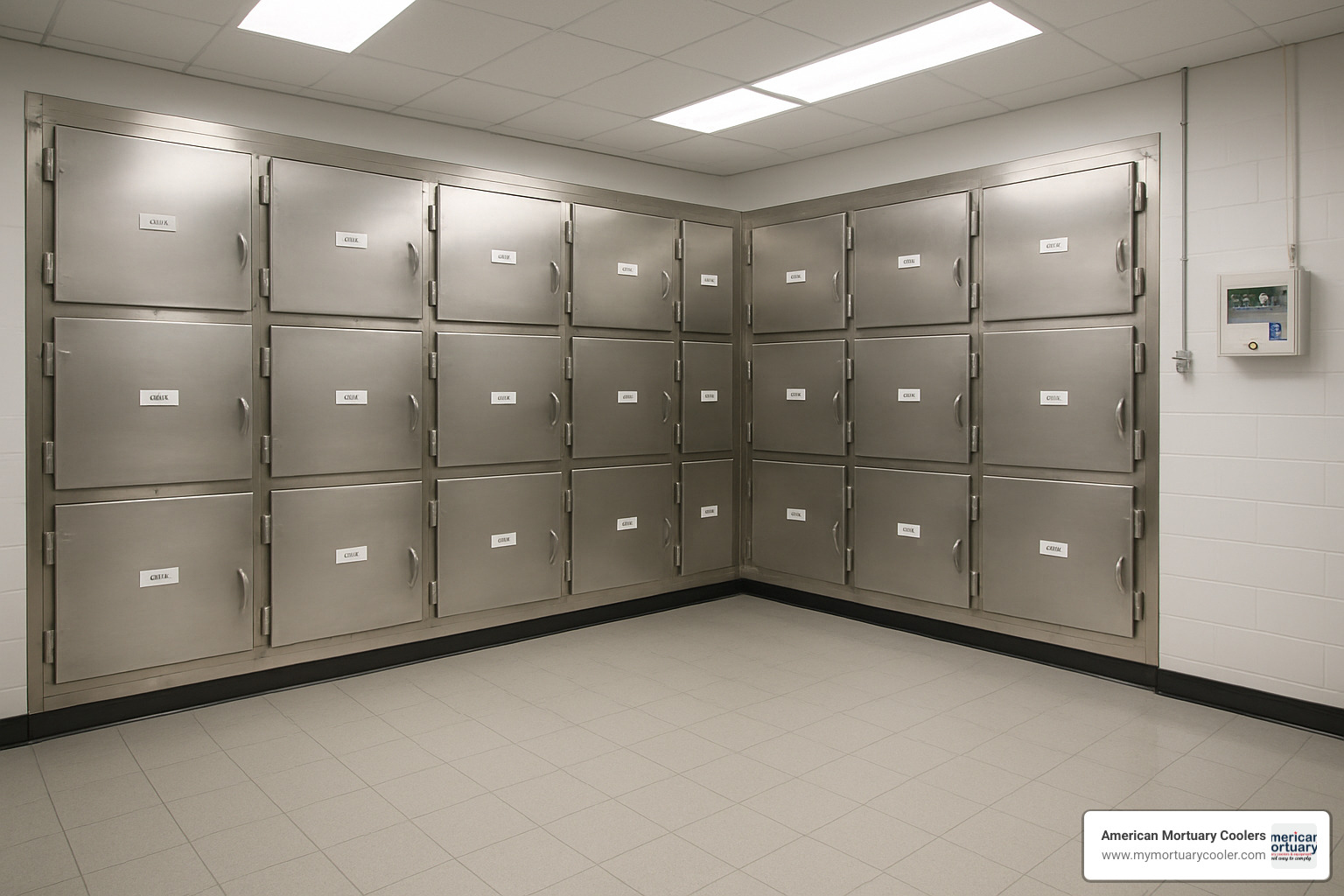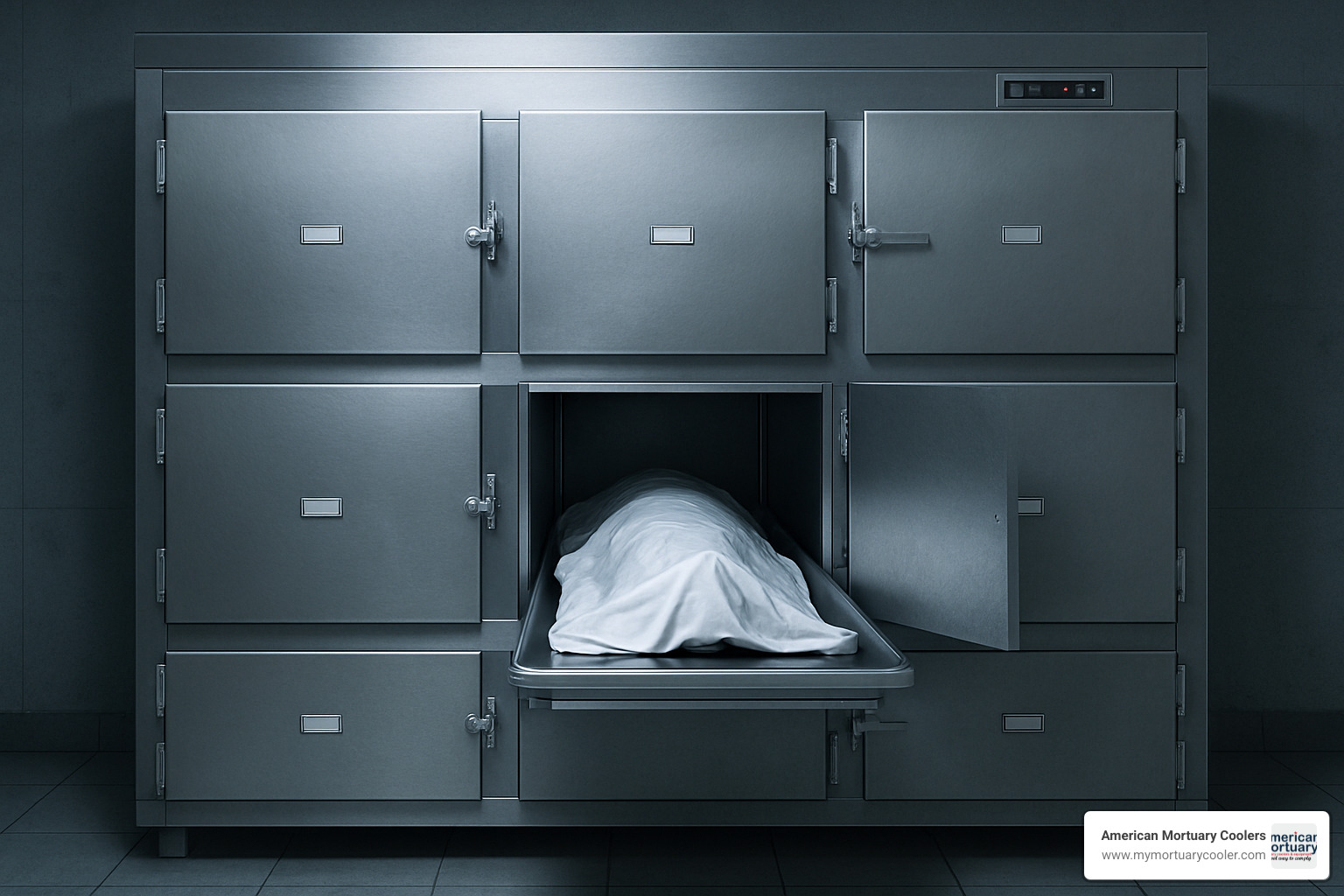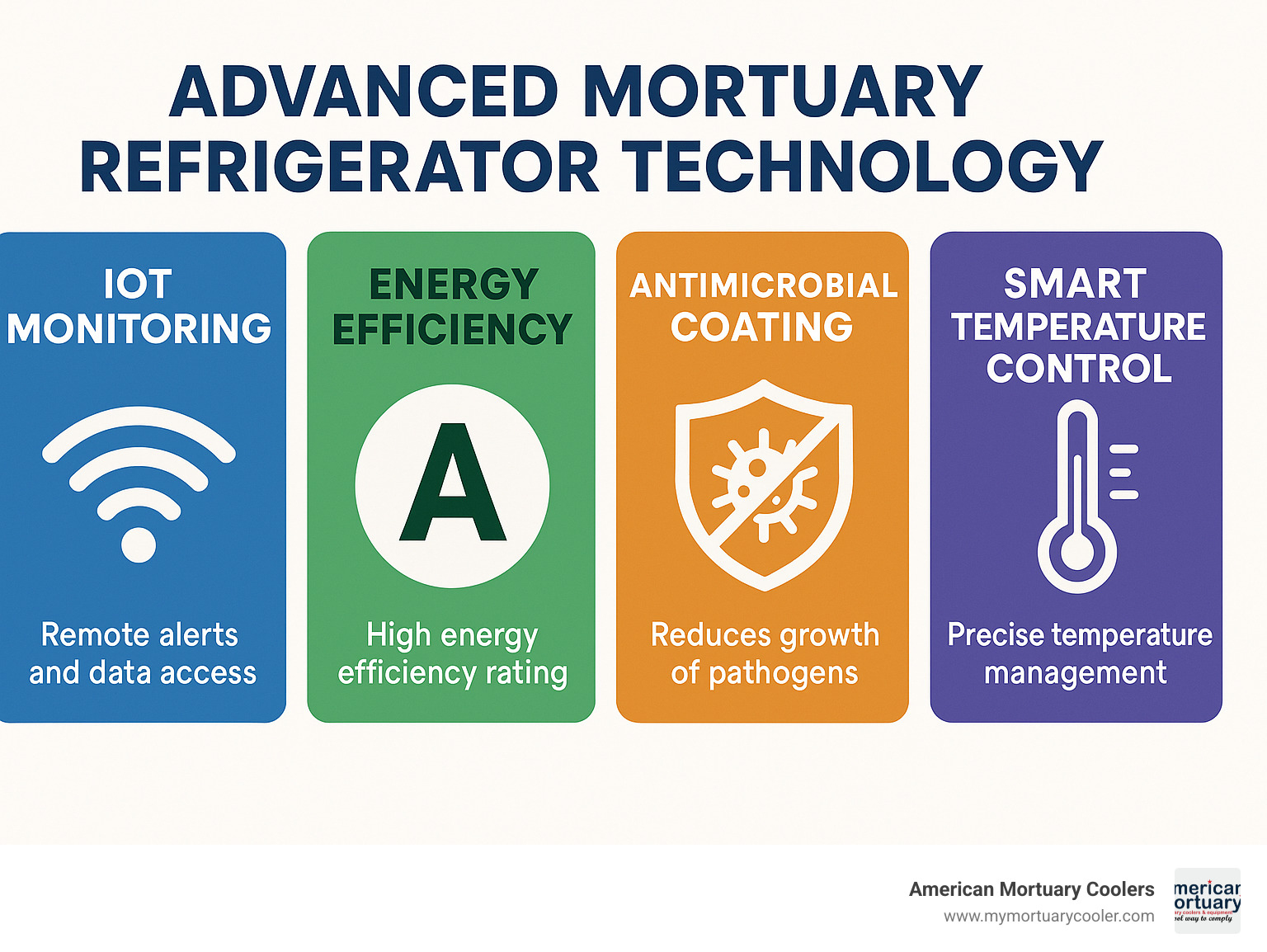
The Ultimate Guide to Mortuary Refrigerator Options and Features
Why Mortuary Refrigeration is Critical for Professional Body Storage
A mortuary refrigerator is specialized equipment designed to maintain bodies at controlled temperatures between 2°C to 4°C (36°F to 39°F) to slow decomposition and preserve remains for identification, autopsy, burial, or cremation. These units are essential in hospitals, funeral homes, morgues, and forensic facilities worldwide.
Quick Overview: Mortuary Refrigerator Essentials
- Primary Purpose: Delay body decomposition through controlled refrigeration
- Standard Temperature: 2°C to 4°C (36°F to 39°F) for preservation
- Freezer Option: -10°C to -50°C (-14°F to -58°F) for long-term forensic storage
- Capacity Range: Single-body units to walk-in systems storing 50+ bodies
- Key Materials: 304-grade stainless steel construction with polyurethane insulation
- Power Requirements: Most plug into standard 110V outlets
- Warranty: Typically 15 years on panels/doors, 5 years on mechanical components
Modern mortuary refrigerators feature digital temperature controllers with audio-visual alarms, antimicrobial surface treatments, and modular designs that can be easily relocated or expanded as facilities grow.
Why proper refrigeration matters:
- Maintains dignity and appearance for family viewings
- Prevents health hazards from decomposition
- Provides scheduling flexibility (potentially eliminating embalming needs)
- Ensures compliance with health department regulations
- Supports forensic investigations requiring evidence preservation
As Mortuary Cooler, a national-level mortuary cooler supplier, I've helped hundreds of funeral homes and healthcare facilities select the right mortuary refrigerator systems for their unique needs.

Why This Guide Matters
The mortuary refrigeration industry has seen significant changes in recent years. Rising consumer demand for cremation and private graveside funerals has changed how funeral homes approach body storage. Many facilities now turn to refrigeration as their primary preservation method.
This shift brings both opportunities and challenges. While refrigeration provides tremendous scheduling flexibility and cost savings, selecting the wrong equipment can lead to compliance issues and health department violations. Our comprehensive guide addresses these buyer pain points, ensuring you make informed decisions that protect both your operation and the families you serve.
Mortuary Refrigerator Basics: Purpose, Temperature & Standards
A mortuary refrigerator gives families time - time to gather, make thoughtful decisions, and say goodbye with dignity. The science is straightforward: bacterial activity causing decomposition slows dramatically in cold temperatures. By maintaining precise cooling, these units preserve bodies for days or weeks, eliminating rushed funeral arrangements.
How a Mortuary Refrigerator Preserves Bodies
A mortuary refrigerator uses a vapor-compression cycle fine-tuned for body preservation. R-134a refrigerant circulates through the system, providing consistent cooling without environmental concerns. Forced-air circulation ensures every corner maintains the same temperature.
The insulation is key. High-density polyurethane foam, typically 80-100mm thick, creates an efficient thermal barrier maintaining rock-solid temperature stability. Digital controllers with PT-100 sensors monitor conditions constantly, making micro-adjustments to maintain perfect preservation temperatures.
Global Temperature Standards for Mortuary Refrigerators
Temperature standards form the foundation of respectful care. WHO guidelines and CDC references have established industry practices worldwide.
Positive temperature chambers operate in the 2-4°C range (36°F to 39°F) and handle most mortuary refrigeration needs. This range provides excellent preservation for short to medium-term storage, typically hours to several weeks.
Negative temperature chambers work at -10°C to -50°C (14°F to -58°F). These freezer systems serve specialized needs like forensic storage, research applications, and mass casualty situations requiring months or years of preservation.
The -18°C freezer standard is important for forensic institutes requiring long-term evidence preservation. However, most funeral homes find the 2-4°C positive range meets their needs while avoiding higher energy costs.
Alarm tolerances are critical safety features. Industry standards typically require audio-visual alarms when temperatures deviate more than 2°C from set points. Many facilities use PT-100 sensors connected to remote monitoring systems.
| Chamber Type | Temperature Range | Typical Duration | Primary Applications |
|---|---|---|---|
| Positive Temperature | 2-4°C (36-39°F) | Hours to weeks | Funeral homes, hospital morgues |
| Negative Temperature | -10 to -50°C (14 to -58°F) | Months to years | Forensic storage, research facilities |
For detailed technical specifications, check out The Complete Guide to Body Fridges and Mortuary Refrigerators.
Configurations & Capacity Options
Modern mortuary refrigerator options suit every facility's needs, from small-town funeral homes to busy metropolitan morgues. The flexibility allows facilities to start small and expand as business grows.

Single- & Multi-Body Cabinets
Most funeral homes start with single or multi-body cabinets. These workhorses handle daily operations while fitting into existing spaces.
Single-body units are perfect for smaller operations or backup systems. They plug into standard wall outlets with no special electrical work needed. Multi-body cabinets, ranging from 2 to 9 body capacity, offer the sweet spot for most facilities.
2-body and 3-body configurations are most popular. A typical 2-body mortuary refrigerator measures about 7'3" wide by 3'3/4" deep by 5'2" high externally, with 6'8" x 2'5 3/4" x 4'10 1/2" internal storage space.
Quality units feature 304-grade stainless steel interiors that clean easily and last decades. Telescopic rack systems slide out smoothly on nylon rollers, making loading easier on staff. Heavy-duty chrome-plated hardware handles daily use without wearing down.
Modern units include digital temperature controllers with LED displays and magnetic gasket overlap doors for superior sealing. Many feature antimicrobial SmartProtec® finishes that actively fight bacterial growth.
Walk-In & Modular Systems
Walk-in systems maximize storage while maintaining easy access. Prefabricated modular panels connect using tongue-and-groove joints, creating complete thermal insulation with incredible flexibility.
Cantilever rack systems maximize storage density while keeping individual access easy. Facilities can nearly double effective capacity by switching from cabinet-style units to well-designed walk-in systems.
Capacity typically starts around 4-5 bodies and scales to 50+ bodies for major facilities. Common configurations are 8-10, 16-20, and 24-30 body systems. The scalability allows expansion by adding panels and racks rather than replacing entire systems.
More info about morgue fridge options covers additional walk-in configuration details.
Specialty & Portable Solutions
Bariatric roll-in systems feature reinforced construction and wider door openings for oversized situations. Portable solutions include pop-up mortuary tents with integrated cooling for emergency deployment and trailer-mounted systems for remote locations.

AirCool lightweight systems offer surprising capacity in compact, moveable packages. Solar backup systems and battery-powered options ensure continuous operation during power failures, proving invaluable during natural disasters or infrastructure problems.
Key Features, Materials & Technological Innovations
Today's mortuary refrigerator units blend cutting-edge technology with practical design. Modern units feature high-density polyurethane insulation for temperature stability and 304-grade stainless steel interiors that resist corrosion and clean easily.
Antimicrobial coatings actively fight bacteria growth, providing extra protection beyond regular cleaning. Digital PID controllers maintain temperature within fractions of a degree, while audio-visual alarm systems alert staff immediately to problems. LED lighting systems use minimal power while providing excellent illumination.
Temperature Control & Safety
Modern systems use dual condensers for backup protection - if one fails, the second activates automatically. Battery-powered alarm systems ensure alerts during power outages, with advanced units sending remote notifications to smartphones.
Safety features include OSHA-compliant release handles in walk-in units and gasket integrity monitoring. PT-100 temperature sensors provide pharmaceutical-grade accuracy, helping maintain health department compliance.
Racks, Trays & Handling Accessories
Telescoping shelves slide out smoothly on precision bearings rated for 300+ pounds. Cantilever rack systems in walk-in units maximize storage capacity while maintaining easy access - often 30-40% more capacity in the same footprint.
Hydraulic mortuary lifts safely handle up to 1,000 pounds with minimal staff effort. Stainless steel transport trolleys with precision wheels make transfers smooth and quiet.
Sustainability & Future Tech
Low-GWP refrigerants replace older chemicals while often working more efficiently. IoT monitoring systems track everything from energy usage to door opening frequency, learning normal patterns and alerting to anomalies.
AI diagnostic systems analyze performance data to optimize efficiency and predict component failures. Modular retrofit options allow upgrading existing equipment rather than complete replacement.

Buying, Installing & Maintaining Your Mortuary Refrigerator
Choosing the right mortuary refrigerator requires understanding your specific needs before diving into specifications. Modern systems last 10-15 years for panels and doors, with 5-year warranties on mechanical components, making this a significant but worthwhile investment.
Pre-Purchase Checklist
Start with capacity planning. Consider current average daily storage and peak times - holidays, flu seasons, or emergencies when you might need double normal capacity.
Evaluate physical space carefully. Measure not just where the unit sits, but the path it takes to get there. Check electrical load capacity - most smaller units use standard 110V outlets, but larger systems may need dedicated circuits.
Consider workflow preferences. Front-loading or side-loading access? How will this integrate with existing procedures? Pay attention to ambient temperature limits - most units have maximum operating temperatures around 95°F.
Our Walk-in Quotation Request helps work through these considerations systematically.
Installation & Commissioning Best Practices
Modern mortuary refrigerators offer straightforward installation. The foundation matters most - ensure your floor is level for proper door operation and long-term performance.
Most units offer plug-and-play installation with standard 110V connections. Plan for at least 6 inches ventilation clearance on all sides for proper airflow.
During commissioning, provide proper staff training and document startup parameters - temperature readings, alarm settings, and initial performance data for future troubleshooting.
Preventive Maintenance & Hygiene Protocols
Daily maintenance takes minutes but makes huge differences. Quick visual checks of temperature displays, surface wipe-downs, and door seal inspections become routine. Weekly tasks include testing alarms and cleaning gaskets. Monthly deep cleaning and sanitization are essential for infection control.
Annual professional service keeps warranties valid and catches problems early. Well-maintained units typically consume 15-20% less energy than neglected equipment.
Chill Out: Understanding the Function of Mortuary Fridges offers additional maintenance guidance and troubleshooting tips.
Frequently Asked Questions about Mortuary Refrigerators
What is the ideal temperature for a mortuary refrigerator?
The optimal range for mortuary refrigerator operation is 2°C to 4°C (36°F to 39°F) for standard body preservation. This creates the perfect balance - cold enough to dramatically slow decomposition without damaging tissue appearance for family viewings.
For specialized forensic work or long-term evidence storage, much colder temperatures from -10°C to -50°C (-14°F to -58°F) are needed. These deep-freeze applications are less common but critical for legal and research purposes.
Consistency beats perfection. A unit maintaining steady 3°C is far better than one swinging between 1°C and 5°C. Modern digital controllers keep temperatures steady within ±0.5°C. Temperature fluctuations beyond ±2°C trigger alarms and can compromise preservation quality.
How many bodies can a walk-in mortuary refrigerator hold?
Walk-in capacity depends on several factors beyond square footage:
Compact systems handle 4-5 bodies, medium-capacity systems accommodate 8-10 bodies (most popular choice), large systems store 16-20 bodies, and extra-large installations handle 24-30 bodies, with custom configurations reaching 50+ capacity.
Cantilever rack systems can increase storage capacity by 30-40% compared to traditional shelving in the same floor space. Actual capacity also depends on workflow - easy access needs and bariatric cases requiring extra space.
How often should alarms and sensors be tested?
Weekly testing is industry standard, covering visual and audible alarms, temperature accuracy against calibrated thermometers, and remote notification systems. Don't forget battery backup systems.
Daily checks make sense during peak periods. Annual professional calibration is non-negotiable for regulatory compliance and warranty protection. Alarm systems only help if staff knows response protocols for different alerts.
Conclusion
Choosing the right mortuary refrigerator represents one of your facility's most important investments. Today's systems offer scalable solutions that grow with your business, advanced infection control features, and energy-efficient designs delivering real cost savings over their 15-20 year lifespan.
From compact 2-body units perfect for smaller operations to sophisticated walk-in systems with smartphone alerts and predictive maintenance, there's a solution for every need. The key is understanding your specific requirements and partnering with industry experts.
At American Mortuary Coolers, we've perfected our approach to custom delivery solutions. Our Tennessee manufacturing facility ensures complete quality control, while our presence in Atlanta, Chicago, Columbia, Dallas, Los Angeles, New York, and Pittsburgh means you're never far from support. We deliver directly across all 48 contiguous states.
The funeral industry continues evolving, and thriving facilities invest wisely in reliable, efficient equipment today. Focus on total cost of ownership - energy efficiency, maintenance requirements, warranty coverage, and supplier reputation matter more than saving dollars upfront.
Every facility has unique needs, and we enjoy crafting solutions that fit perfectly. Whether replacing decades-old equipment, expanding to meet growing demand, or planning entirely new facilities, the right mortuary refrigerator system serves as the foundation for everything else you do.
The Complete Guide to Buying a Morgue Refrigerator for Sale provides additional insights into financing options and the purchasing process.



